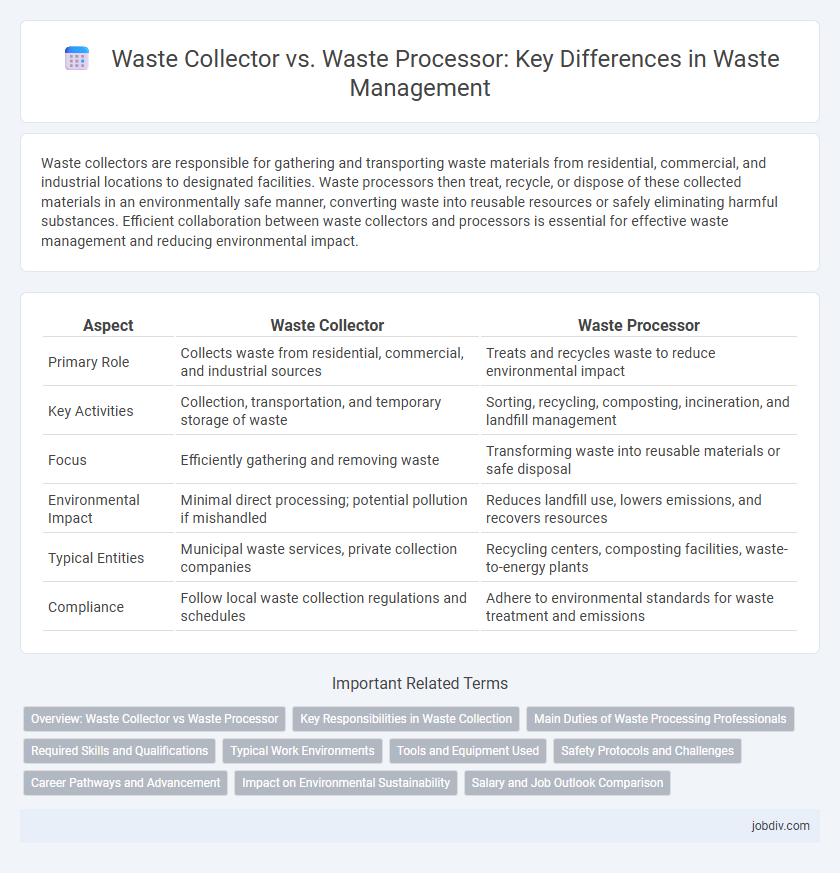Waste collectors are responsible for gathering and transporting waste materials from residential, commercial, and industrial locations to designated facilities. Waste processors then treat, recycle, or dispose of these collected materials in an environmentally safe manner, converting waste into reusable resources or safely eliminating harmful substances. Efficient collaboration between waste collectors and processors is essential for effective waste management and reducing environmental impact.
Table of Comparison
| Aspect | Waste Collector | Waste Processor |
|---|---|---|
| Primary Role | Collects waste from residential, commercial, and industrial sources | Treats and recycles waste to reduce environmental impact |
| Key Activities | Collection, transportation, and temporary storage of waste | Sorting, recycling, composting, incineration, and landfill management |
| Focus | Efficiently gathering and removing waste | Transforming waste into reusable materials or safe disposal |
| Environmental Impact | Minimal direct processing; potential pollution if mishandled | Reduces landfill use, lowers emissions, and recovers resources |
| Typical Entities | Municipal waste services, private collection companies | Recycling centers, composting facilities, waste-to-energy plants |
| Compliance | Follow local waste collection regulations and schedules | Adhere to environmental standards for waste treatment and emissions |
Overview: Waste Collector vs Waste Processor
Waste collectors are responsible for gathering and transporting waste materials from residential, commercial, and industrial sites to designated facilities. Waste processors take these materials and sort, treat, or recycle them to reduce environmental impact and recover valuable resources. Efficient coordination between collectors and processors enhances waste management systems, promoting sustainability and reducing landfill dependency.
Key Responsibilities in Waste Collection
Waste collectors are primarily responsible for the systematic gathering and transportation of waste from residential, commercial, and industrial sites to designated disposal or processing facilities. Their duties include sorting recyclable materials at the source, ensuring proper containment to prevent littering or hazards, and adhering to safety protocols during collection operations. Unlike waste processors who focus on treatment and recycling, collectors emphasize efficient waste retrieval to maintain cleanliness and support downstream waste management processes.
Main Duties of Waste Processing Professionals
Waste processing professionals specialize in sorting, treating, and converting waste materials into reusable resources through mechanical, chemical, or biological methods. Their main duties involve operating advanced machinery, managing hazardous waste safely, and ensuring compliance with environmental regulations to minimize pollution. They also optimize waste recovery processes to enhance recycling efficiency and reduce landfill dependency.
Required Skills and Qualifications
Waste collectors require physical stamina, knowledge of safety protocols, and basic operational skills for handling waste collection equipment. Waste processors must possess technical expertise in sorting, recycling technologies, and environmental regulations, often needing certifications in waste management or hazardous material handling. Both roles benefit from strong attention to detail and adherence to health and safety standards to ensure efficient and compliant waste management operations.
Typical Work Environments
Waste collectors typically work outdoors in urban, suburban, or industrial areas, navigating various weather conditions while collecting refuse from residential, commercial, and public locations. Waste processors operate primarily within waste treatment facilities, recycling centers, or landfills, handling and sorting materials to prepare them for disposal, recycling, or further processing. Both roles require adherence to safety protocols, but waste processors often engage in mechanized tasks within controlled environments.
Tools and Equipment Used
Waste collectors rely heavily on durable tools such as garbage trucks equipped with hydraulic lifts, protective gloves, and handheld scanners for efficient waste identification and collection. Waste processors utilize advanced machinery including shredders, compactors, and sorting conveyors to facilitate material separation, volume reduction, and recycling preparation. Both roles incorporate technology to enhance operational safety and environmental compliance while optimizing waste management workflows.
Safety Protocols and Challenges
Waste collectors face significant safety challenges, including exposure to sharp objects, hazardous materials, and traffic-related accidents, necessitating the use of personal protective equipment (PPE) and strict adherence to safety protocols like proper waste handling and lifting techniques. Waste processors encounter risks related to chemical exposure, machinery operation, and biohazards, requiring comprehensive training, regular equipment maintenance, and implementation of automated safety systems. Both roles demand rigorous safety standards and continuous monitoring to minimize health risks and ensure environmental compliance.
Career Pathways and Advancement
Waste collectors typically begin their careers with entry-level positions involving manual collection and transport of waste, gaining hands-on experience in route planning and safety protocols. Advancement opportunities can lead to supervisory roles or specialized positions such as hazardous waste handling and equipment operation, often requiring additional certifications. Waste processors focus on sorting, recycling, and treatment technologies, with career progression toward technical expertise, facility management, and environmental compliance roles that demand in-depth knowledge of waste processing systems and regulatory standards.
Impact on Environmental Sustainability
Waste collectors play a crucial role in environmental sustainability by efficiently gathering and segregating waste to prevent pollution and promote recycling. Waste processors transform collected waste into reusable materials or energy, significantly reducing landfill dependency and greenhouse gas emissions. Effective collaboration between waste collectors and processors enhances resource recovery and minimizes ecological footprints.
Salary and Job Outlook Comparison
Waste collectors earn an average annual salary of $35,000 to $45,000, reflecting entry-level to mid-career stages, while waste processors typically earn between $40,000 and $55,000 due to specialized skills in recycling and material recovery. Job outlook for waste collectors is projected to grow 11% from 2022 to 2032, matching the average growth rate for all occupations, driven by ongoing demand for municipal solid waste management. Waste processors face a slightly higher growth rate of 12%, fueled by increasing environmental regulations and advancements in waste processing technologies.
Waste Collector vs Waste Processor Infographic

 jobdiv.com
jobdiv.com